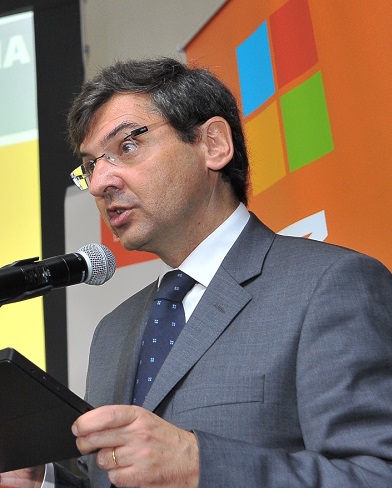Challenges and opportunities aplenty for Microsoft in Malaysia
By A. Asohan August 23, 2013
- New MD’s priority is ensuring his team is up to the challenge and opportunity the company sees in Malaysia
- Is confident of Surface device, believes tablet landscape going to be very different in one year
 ONCE the darling of Wall Street and a dominant (some would domineering) force in the desktop operating system (OS) space, with an estimated 95% global market share at one stage, US technology giant Microsoft Corp has not been having the best of times recently.
ONCE the darling of Wall Street and a dominant (some would domineering) force in the desktop operating system (OS) space, with an estimated 95% global market share at one stage, US technology giant Microsoft Corp has not been having the best of times recently.
The world has changed around it. The smartphone and tablet brigade quickly moved from the consumer space to march into the enterprise battleground that Microsoft had felt most secure in. Application software use is increasingly moving from a purchase to a subscription model.
Its competitors today are very different from the challengers it saw off, or neutralised, just five years ago. Industry pundits and stock market watchers have been unrelenting in their criticism of the company, even when it records increased revenues, saying it is no longer the innovative company it once was.
While slower to react to market and technology changes than it did in its younger days, the company has made structural changes and taken some risks to claw its way back in the game, but it doesn’t help that its fourth quarter 2013 earnings and sales had missed expectations.
The company reported fourth quarter earnings of US$4.97 billion, or 59 cents a share, on revenue of US$19.9 billion. Analysts had expected fourth quarter earnings of 75 cents a share on revenue of US$20.73 billion.
The results include a US$900-million inventory writedown for Surface RT, ZDNet reported, describing its tablet computer bet as a flop.
It’s enough to keep any Microsoft executive awake, but one might miss the silver linings for the dark clouds.
Few noticed that the company had reported that Business Division revenue grew 14% for the fourth quarter and 3% for the full year; Server & Tools revenue grew 9% for the fourth quarter and 9% for the full year; Windows Division revenue grew 6% for the fourth quarter and 5% for the full year; Online Services Division revenue grew 9% for the fourth quarter and 12% for the full year; and finally, Entertainment and Devices Division grew 8% for the fourth quarter and 6% for the full year.
Challenges and opportunities
It’s all part of a suite of problems that the current managing director of Microsoft Malaysia, Carlos Lacerda has to grapple with since coming on board last November.
The consumerisation of IT or the ‘bring your own device’ (BYOD) trend is chipping away even at the company’s enterprise fortress. Its gradual move to a cloud computing model – first announced by chief executive officer Steve Ballmer in early 2010 – means steadily-recurring subscription revenue but no more massive volume licensing sales or renewals.
On the consumer front, innovations in its Internet Explorer browser and Bing search engine still have not made the market-share impact the company had hoped for. One small bright spot was the news that its Windows Phone smartphone OS has just nudged BlackBerry aside as the world’s third most popular.
Challenges aplenty, but when asked what keeps him awake at night, Lacerda says, “While it doesn’t keep me awake at night – I sleep very well, thank you – my first concern is our people, and how we need to make sure that we are up to the challenge and opportunity that we see in Malaysia.
“That’s No 1,” he says in a conversation with Digital News Asia (DNA), alluding to the workforce changes in a number of key positions the subsidiary has seen in the past few months.
“Concerning technology, I don’t have any worries. I have faith in our R&D (research and development), the products that have come out and the ones that will be released, including solutions from our partners.
“I am very confident in this area, but what I need to do is to build our local capability,” he says.
The company, and Lacerda for that matter, believes it can contribute to Malaysia’s own transformation agenda. The country has set a target to become a developed nation by the year 2020, and this will be driven in part by the Economic Transformation Programme (ETP) to make the nation a high-income economy by that same year.
Supporting this narrative is the fact that Microsoft celebrates its 20th year in Malaysia this year, and the local subsidiary has drafted a ‘National Plan’ (see previous instalment) to help the country in its own aspirations.
Helping Malaysia transform
Each subsidiary had in fact prepared such a plan, at the behest of corporate headquarters back in Redmond, Washington, but the whole exercise seems particularly well suited for the subsidiary here, and lines up very neatly with Malaysia’s own vision.
Microsoft Malaysia’s National Plan initiative is founded on three pillars: Transforming lives, businesses and education with the technologies, expertise and solutions it can bring to bear.
Full disclosure: This writer was employed with Microsoft Malaysia at the time the National Plan was being formulated.
 “Look at it this way -- why is there a Microsoft subsidiary in this country? Sure, it’s an opportunity to be closer to customers and partners, but the only way to be part of the development that Malaysia is undergoing is to invest in the country,” says Lacerda (pic).
“Look at it this way -- why is there a Microsoft subsidiary in this country? Sure, it’s an opportunity to be closer to customers and partners, but the only way to be part of the development that Malaysia is undergoing is to invest in the country,” says Lacerda (pic).
This investment, which he declined to put a figure to, can come in many forms. It includes investing in the subsidiary to grow the company here; investing money to develop projects; and even acting as a catalyst for bringing more Microsoft corporate investments into the country.
Which brings it back to Lacerda’s No 1 priority: People.
“Malaysia is accelerating. A company like Microsoft has to be very different from a transactional perspective – you can’t just come in and sell software. That’s not good enough; not at all,” he says.
“You need deeper engagement, you need to put investments into the country, and you need to develop local people – to make sure we’re up to the challenge of the National Plan and Malaysia’s own vision,” he adds.
What he sees as his job as the managing director of Microsoft Malaysia is to build capacity and capabilities in the subsidiary to take on the challenge, and to also tap into the opportunities that come from national development projects for a technology company.
“What we can do here is prepare our teams,” he says. “If you ask me whether they are all ready, I will tell you honestly, no, they’re not. Are we working hard to be ready? Yes, we are,” he says.
“What are we doing? You asked about investments, and the top investment we can make is in the readiness of our teams. We need to have them ready, to have them understand the opportunities that are coming with the cloud and tablet computing, and in education,” he adds.
Lacerda is still confident of Microsoft’s tablet computing bet, despite it having hardly made an impact against Apple’s iPad or the horde of Android devices out there.
“Look at the tablet landscape. You may say, yes but Microsoft is hardly present. This actually represents a huge opportunity for us. Wait a year, and I can tell you that the tablet landscape is going to be very different from what it is today,” he says.
“There are a lot of opportunities coming right now, and the pace of change is very much accelerated, so we need to transform ourselves to cope with this transformation,” he adds. “Are we ready? No. Are we going to be ready? Yes, I have no doubt.”
Previous instalment: Microsoft Malaysia MD: Not here to clean up, but to build on
For more technology news and the latest updates, follow @dnewsasia on Twitter or Like us on Facebook.


